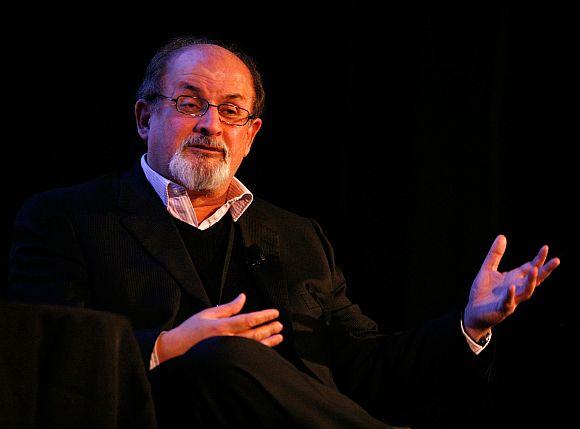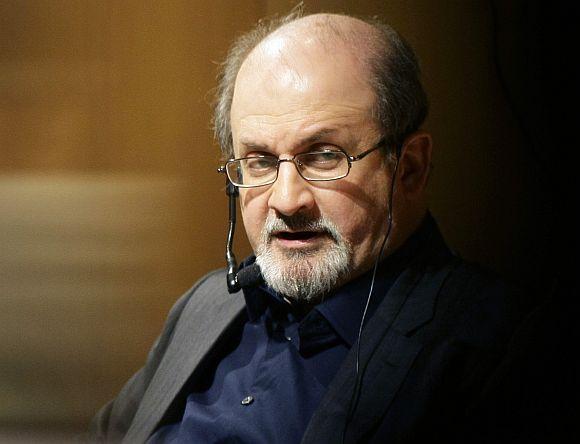Twenty four years after he shot off an open letter to the then Prime Minister Rajiv Gandhi criticising the ban on The Satanic Verses, India-born controversial author Salman Rushdie now admits that his reaction was "arrogant", "angry" and "cheek".
65-year-old Rushdie, whose 633-page memoir titled Joseph Anton hit the stands on Tuesday, narrates mainly his life in hiding for over nine years after the controversial book resulted in an Iranian 'fatwa' and world-wide protests against him, but also writes feelingly about his engagement with India.
In the book written in the third-person, Rushdie recalls that Salman Haider, a family friend and the then deputy high commissioner of India in London, had called him to formally inform him that The Satanic Verses had been banned in India.
Rushdie writes that the ban pained him, more so after his previous book, Midnight's Children, had been "so enthusiastically received" in India, which was "a source of great pride."
It made the ban on importing The Satanic Verses in the country "a painful blow."
...
Scolding a PM was arrogant: Salman Rushdie
On his widely-published open letter to Rajiv Gandhi at the time, Rushdie admits that it was arrogant: "This was not how novelists were supposed to behave: scolding a prime minister. This was arrogant. This was cheek."
The author goes on: "Well, OK, that was arrogant. Angry and injured also, but the arrogance was undeniably there. Very well. So it was. He was defending a thing he revered above most things, the art of literature, against a piece of blatant political opportunism. Maybe a little intellectual arrogance was called for."
Rushdie writes that the open letter was an attempt to take the cultural high ground, and it concluded with a rhetorical appeal "to that posterity whose judgement could not be known by either Rajiv Gandhi or himself: 'You own the present, Mr Prime Minister; but the centuries belong to art'."
...
Scolding a PM was arrogant: Salman Rushdie
According to Rushdie, Indian governments from the mid-1970s onwards, "ever since the time of Indira and Sanjay Gandhi," had "often given in to pressure from religious interest groups, especially those claiming to control large blocks of votes."
He writes: "By 1988, Rajiv Gandhi's weak government, with elections due in November, cravenly surrendered to threats from two opposition Muslim MPs who were in no position to 'deliver' the Muslim electorate's votes to the Congress party."
Recalling the ban on The Satanic Verses, Rushdie writes that he did not expect it, "innocently, naively, even ignorantly."
Subsequently, more attacks on artistic freedom in India followed, such as attacks against M F Hussain, Rohinton Mistry and Deepa Mehta, he says.
"But in 1988 it was possible to believe in India as a free country in which artistic expression was respected and defended. Book burning was something that happened all too frequently across the border in Pakistan. It wasn't the Indian way," he writes.
...
Scolding a PM was arrogant: Salman Rushdie
The presumption of intellectual freedom and respect in India was ever-present, Rushdie writes, except during the Emergency, and adds that he had been proud of that openness and had boasted of it to people in the west.
"India was surrounded by unfree societies -- Pakistan, China, Burma -- but remained an open democracy; flawed, certainly, perhaps even deeply flawed, but free," Rushdie writes.
According to him, the book was not examined by any properly authorised body in India, "nor was there any semblance of judicial process."
It had been banned under Section 11 of the Customs Act, which prevented the book from being imported.
It was "weird", Rushdie writes, that the Finance Ministry stated that the ban "did not detract from the literary and artistic merit" of the book.
His response to that was: "Thanks a lot."





article